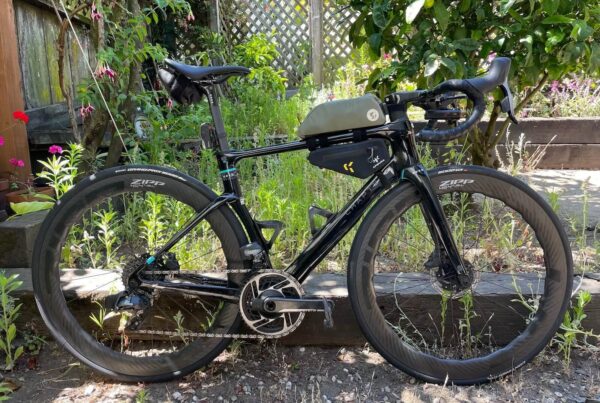A few months ago, Bob received a call from a call from a cyclist in West Virginia. The cyclist—Tony Patrick—had an amazing story to tell; while out on a training ride in southern Ohio, he had been ordered off the road by a Sheriff’s Deputy, and when he asserted his right to ride on the road, he was confronted, beaten, and tased by law enforcement officers.
I spent many hours reading through the police report, hearing transcript, and court decision, as well as talking with Tony, and his riding partner, and Steve Magas, an Ohio bicycling attorney (and a contributing author ofBicycling & the Law) who will be representing Tony, to research exactly what had happened, in preparation for a Road Rights column on the incident. That column, When the Cop Says Stop, was published on April 22, 2009. It generated a lot of reader response, as well as our first-ever “counter-point” column, authored by a Tallahassee Police Lieutenant.
We were expecting that the story would be shocking, particularly for readers who may be unfamiliar with the kind of anti-cycling bias held by some members of law enforcement, and that has been well-documentedby Bob over the years. What we weren’t expecting, however, was the sheer number of responses from readers who thought that Bob was advising cyclists to challenge the authority of law enforcement officers making traffic stops. That was clearly not the case—Bob had specifically advised readers to stop when a law enforcement officer asks you to stop. So, Bob asked me to respond to the comments we had received, reiterating his advice that (1) cyclists should stop when asked by law enforcement to stop, and (2) cyclists should nonetheless assert their right to use the roads, politely, and if necessary, accept a ticket and assert that right in court. This was, in fact, not only what Bob had advised in When the Cop Says Stop, it was also what many readers, including law enforcement officers, advised in response to the column. We were all on the same page really, and the response I drafted was in some sense meant to assure readers of that.
So I posted a reply to When the Cop Says Stop, reiterating Bob’s advice to assert your right to the road in the proper forum—the courts—rather than disobeying an officer’s order, or alternatively, acquiescing to an officer’s attempt to enforce a non-existent law. And of course, I reminded cyclists that before asserting their rights, they must be absolutely familiar with ALL of the applicable laws. This is because local laws are just as enforceable as state laws, IF the local laws do not conflict with state law—and sometimes, something that might not be explicitly illegal under state law might nevertheless be against the law at the local level.
And sometimes, local governments might pass an ordinance that is in conflict with state law, and is thus unenforceable. The problem with that is that the local law enforcement officers won’t consider an invalid local law “unenforceable,” and the local court might not consider the local law “unenforceable” either. So I suggested that even if the local court enforces an invalid local law, a conviction can be thrown out by a higher court.
And a nagging voice in my head left me troubled about that suggestion, because I remembered an article I had read about problems with local courts in New York state. That article, In Tiny Courts of N.Y., Abuses of Law and Power, was published on September 25, 2006, and was actually the first of a three-part series in the New York Times detailing a shocking state of affairs in the “Town & Village Courts” in New York. Some of the problems in the “Justice Courts”:
• Three-fourths of the judges in the Town and Village Courts are not lawyers—many of them have a high school diploma, some of them never completed high school, and at least one “went no further than grade school.”
• One judge remarked “I just follow my own common sense, and the hell with the law.”
• Defendants have been denied access to attorneys.
• Defendants have been jailed without bail or trial—in one Judge’s court, jail time was used to coerce guilty pleas from defendants.
• In one court, defendants have routinely been jailed for longer than the law allows.
• A defendant contesting a speeding ticket was jailed without warning for three days, because he called a Sheriff’s Deputy a liar.
• Judges are overly-deferential to law enforcement and prosecutors; one court was closed to the public, and trials were run by the prosecutor; another judge even had the prosecutor write her decision for her, because she did not “really have time to puzzle this out.”
• Another judge decided in favor of the defendant in a civil case before the trial was held.
And here’s the thing—this utterly incompetent administration of “justice” is not limited to New York (although the problem seems to be particularly acute in New York). In fact, New York is only one of about thirty states that still rely on a system of part-time, unschooled judges, although many of those roughly thirty states have begun instituting reforms in the system, or scrapping it altogether.
So what kinds of cases do these courts hear? You name it, they hear it—criminal cases, civil cases, and of course, traffic cases. In fact, traffic cases make up the bulk of the trials in the Town and Village courts.
And thus, after we advised that cyclists should assert their right to the road, and after explaining that local laws in conflict with state law can be challenged in court, that nagging voice in my head was reminding me that some local courts are presided over by incompetents with no understanding of or respect for the law.
So be careful out there. If you ever do find yourself appearing before a small-town part-time judge with no legal training, your well-reasoned arguments about the law may be falling on the ears of somebody who simply doesn’t understand the law, or your arguments. If so, and if you are convicted, which would be the most likely outcome of a case involving “legal issues,” your best option for justice may be to appeal your conviction to a higher court.




Another case of police shakedown.
https://www.cnn.com/2009/CRIME/05/05/texas.police.seizures/index.html
An interesting encounter with a local officer.
https://northshorewheelmen.blogspot.com/2009/08/sunday-823-nsw-vs-old-westbury-police.html